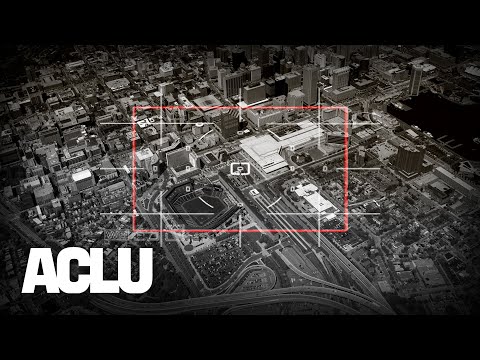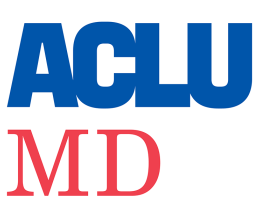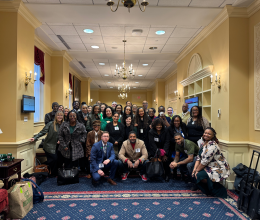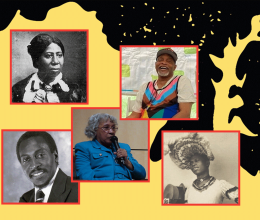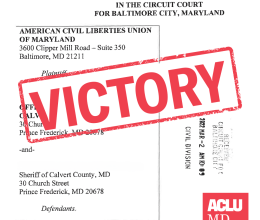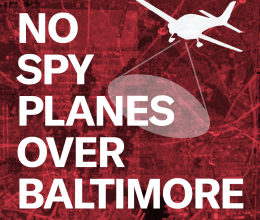
BALTIMORE — The American Civil Liberties Union (ACLU) and ACLU of Maryland filed a lawsuit today against the Baltimore Police Department (BPD) to challenge the constitutionality of deploying a wide-area aerial surveillance program that will put virtually all Baltimore residents under constant, aerial surveillance.
In the lawsuit, the ACLU argues this surveillance system presents a threat to our individual right to privacy and free association under the First and Fourth Amendments, respectively. The legal team is seeking an injunction blocking the operation of this aerial surveillance program. The suit was filed on behalf of Leaders of a Beautiful Struggle, grassroots think tank that advances the public policy interests of Black people in Baltimore, Erricka Bridgeford, co-founder of the Baltimore Ceasefire 365 project, and Kevin James, a community organizer and hip-hop musician.
The BPD has contracted with a private company, Persistent Surveillance Systems (PSS), to pilot this “Aerial Investigation Research” program. PSS’ high-resolution, camera-equipped planes will fly over the entire city of Baltimore at least 40 hours a week. The cameras create a slow frame rate video record of everywhere that anyone goes, allowing police to retroactively track a person’s movements from any place or time. The pilot program is set to begin this month for a trial period of 180 days.
This aerial surveillance technology can be easily combined with the BPD’s existing ground cameras, license plate readers, and other sensors to tie data together and provide highly detailed information about residents’ identities and activities. The BPD has stated the program’s intended purpose is to aid in solving criminal investigations, however, government officials have a history of secretly using similar technology for other purposes — including to surveil Black Lives Matter protests in Baltimore in recent years.
Below are comments from:
David Rocah, senior staff attorney at the ACLU of Maryland: “Putting residents under continuous, aerial surveillance will impact the privacy rights of everyone, but it is especially dangerous for Black and Brown communities. Baltimore is a city with a terrible history of racism and lack of accountability for abuses by police. It’s the last place a novel system of mass surveillance should be tested.”
Brett Max Kaufman, senior staff attorney in the ACLU’s Center for Democracy: “The BPD’s unconstitutional aerial surveillance program would be the most wide-reaching surveillance dragnet ever employed in an American city, and if it’s allowed to move forward, it could become a chilling and all-seeing part of daily life all over the country. This technology is the equivalent to having a police officer follow you every time you leave the house. It presents a society-changing threat to everyone’s rights to privacy and free association, and we need to put a stop to it now.”
Plaintiff Erricka Bridgeford, who co-founded the Baltimore Ceasefire 365 project, which aims to reduce gun violence through Ceasefires and Peace Challenges: “The best way to reduce violence is through community building and healing strategies — not through military-grade surveillance programs. Rather than investing time and energy in futuristic surveillance, the city of Baltimore and the Baltimore Police Department should invest in programs to address the root causes of violence.”
Plaintiff Dayvon Love, director of public policy with Leaders of a Beautiful Struggle: “We are gravely concerned about the historic role surveillance has played in enabling the government to target and harm organizations with our sensibilities — those of us who have been trained and socialized into the Black radical tradition. Throughout our country’s history, federal agencies have worked in collaboration with local law enforcement to surveil political dissenters. We are adamantly opposed to a program that gives law enforcement new and improved tools to watch and potentially harm people who challenge the dominant social order and power structure.”
Plaintiff Kevin James, a community organizer and hip-hop musician known as Son of Nun: “I am personally concerned by the AIR program’s Orwellian nature. The city and the Baltimore Police Department may claim that if you are not doing anything wrong, you do not have anything to worry about. But that claim is clearly disproven by the countless historic examples where the government used surveillance to oppress groups they find politically threatening. It is disquieting to know someone is watching you all the time — it is dark, sinister, and unjust.”
This case was filed in U.S. District Court for the District of Maryland.
The complaint can be found here.
